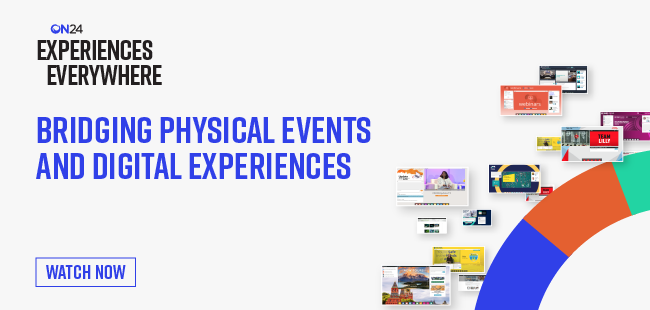Four Tips for Preparing for a Hybrid Event World
Marketers have settled in for the first half of 2021 that will feature virtual events and digital experiences as the keystones for their marketing strategies. People are optimistically hoping for a return to some in-person experiences later in the year.
Of course, any in-person event will be subject to local guidelines regarding health and safety protocols and audiences’ appetite for attending such experiences.
With that in mind, there will be significant regional disparities in how this will be rolled out and potentially rolled back at times. Having the agility to calibrate based on regional conditions, scale-up digital components or enhance physical interactions will be critical for all marketers.
The standard for these events will be hybrid — an event type that will encompass both physical and digital tactics within an event container. Hybrid events allow marketers to scale up or scale down based on safety concerns for themselves, sponsors and audience members.
This will require a new form of collaboration between digital marketers and event marketers and planners, including field marketing. Whereas 2020 was focused on ripping out physical events and replacing them with virtual events, especially in the first half of the year, now hybrid events will have more runway and contingency plans.
While these separate marketing teams have often operated in silos, now any event — digital or physical — will require a reforming and re-norming of the relationships between the two teams.
As marketing functions and titles can be incredibly confusing at best, I’ll talk about it from the perspective of people who have traditionally or predominantly planned digital experiences as opposed to those who have executed physical events.
Here are some tips to establish or improve these relationships.
Tip 1: Set Common goals.
At the end of the day, the best way to unite teams is to align on common metrics and KPIs. For hybrid events, it is important to unite around core categories for measurement. Just know that, depending on the format, the way to get to those metrics will change.
For example, the conversion is an essential metric that can be measured for physical, digital or hybrid events. For hybrid events, you can evaluate physical vs. digital, as well as overall conversion.
Tip 2: Set Content ROI Goals.
One thing that digital and event marketers can agree on is that they’re trying to get more out of the content that they have. Finding ways for both sets of marketers to leverage and reuse content from hybrid events is critical.
Setting up brainstorms to make sure that content can be amplified through all event types is critical. The first steps would include content repurposing across event types.
Tip 3: Evaluate Technology.
One of the core differentiators of those teams are the marketing and sales technologies that they use and have integrations into based on past experiences. This is an emerging area of focus for these teams.
To make things more complicated, each set of vendors are trying to push into the other category. The important area of focus here is to focus on the use cases you have for hybrid events, and not get caught up in vendor spin.
Tip 4: Acknowledge the differences.
A key to success is understanding that, while both marketing disciplines, there are different strengths and areas of focus for both teams. From this, there is a lot that both teams can learn from each other.
For example, digital marketers tend to have more access and familiarity in working with data and the associated analysis, whereas event marketers are experts in logistics and creative ways to draw audiences in.
As hybrid events evolve and mature, marketing teams will become more adept at working with one another. These forces will create stronger synergies between them that will create new styles of roles.
A few years ago it would have been nearly impossible to consider an events leader would need to be adept at understanding the virtual event and digital experience technologies. Now, it is critical for both sets of teams to evolve in order to meet audience needs.

